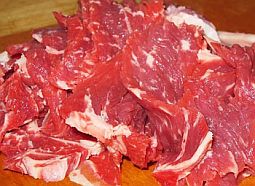Baltic States – CIS, EU – Baltic States, Legislation, Markets and Companies, Russia
International Internet Magazine. Baltic States news & analytics
Tuesday, 23.04.2024, 14:30
Russia expands embargo on EU meat products
 Print version
Print version |
|---|
Rosselkhoznadzor said it had "no reason to trust" guarantees presented by the European Commission, explaining that dangerous substances and antibiotics had been found in meat imported from the EU.
Russia's food embargo has so far reduced food prices in Europe to a record-low, whereas food prices in Russia are expected to continue to increase.
"From October 21, new restrictions will apply to the import of beef by-products, trimmings and other products that the August embargo did not apply to," said Rosselkhoznadzor head Sergei Dankvert, as the Interfaxt news agency reports.
During the past two months, there were seventeen cases when dangerous substances and antibiotics were found in meat byproducts imported from six EU countries, said Dankvert. He did not reveal what substances he was talking about.
In a later statement, Rosselkhoznadzor already mentioned five countries from which subpar meat products had been imported.
"During the past two months, Rosselkhoznadzor ascertained, while performing federal security monitoring measures, seventeen cases when sub-products imported from several EU countries (Austria, Denmark, Italy, Poland and Germany) did not meet the Customs Union and Russia's veterinary and sanitary requirements," Rosselkhoznadzor said in the statement.
It is particularly alarming that chloramphenicol, an antibiotic that is banned in the EU, was found in these products, added Rossselkhoznadzor.
"This means that the EU veterinary authorities do not control implementation of the Customs Union's requirements, nor their own laws and regulations," the Russian service said.
The violations are "systemic and grave," therefore Rosselkhoanadzor believes it necessary to temporarily halt import of by-products from EU companies as of October 21.
Commenting on contraband pork, Dankvert said that there had been attempts to bring into Russia 7,500 tons of meat from Germany and Lithuania and, possibly, from Latvia, Belarus, and Kazakhstan.
As reported, on August 7 Russia banned import of most food products from the EU, United States and other Western countries that had adopted sanctions against Moscow. Russia's embargo concerns beef, pork, fruit, vegetables, poultry, fish, cheese, milk and dairy products.








 «The Baltic Course» Is Sold and Stays in Business!
«The Baltic Course» Is Sold and Stays in Business!

